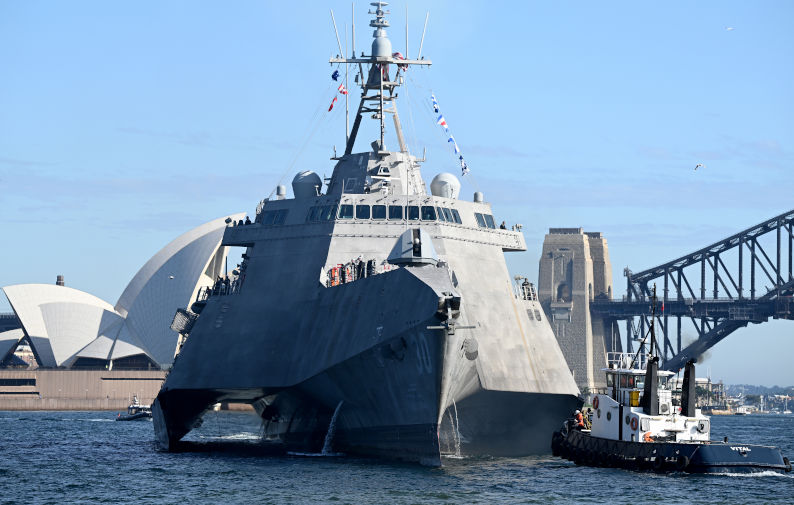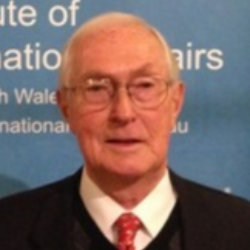The US in Australia---and in China!
July 23, 2023
The coming week will see an enormous festival of US alliances with and in Australia, with the biggest Talisman Sabre exercise ever, and a visit to Australia by the US Secretaries of State and Defence for the annual AUSMIN talks. All of this has been made more glamorous by the arrival of a new US warship, commissioned as USS Canberra while here.
These activities also have an anti-China aspect to them, one in effect welcomed by Defence Minister Marles in remarks reported in the Canberra Times of 19 July, when he said that Australias defence co-operation with the US is unprecedented in scale, scope and significance. Australia will continue to work with our partners, including the United States, to build a region that is peaceful, stable and prosperous, including through the longstanding US Force Posture Initiatives in Australia. A number of these Force Posture Initiatives involving US bombers and submarines are widely seen as essentially relevant only to a future US war with China.
The same press report quoted Foreign Minister Wong as saying that Australia and the US want to better support our partners in the region, and to promote peace, protect sovereignty and foster prosperity. She said that the two governments were broadening the coming talks to include emerging technologies, the clean energy transition and the role of critical minerals.
In the past she has said more than that. In 2019, as Shadow Foreign Minister, she said that over the next decades, neither the United States nor China will be able to exert undisputed primacy. In 2018 she said that Australia should seek a multipolar order in Asia, a multipolar region in which the United States remains deeply and constructively engaged, in which China is a positive contributor, and in which the perspectives and contributions of smaller powers are respected and valued. This is the sort of perspective likely to command the support of the countries of ASEAN, which do not want to be forced to take sides in a US-China war.
But this perspective is not the one conjured up by the kinds of remarks repeatedly made by our Defence Minister, who as noted above appears to welcome the idea of building up military capacity against China, even though Chinas policy towards us seems to be to work towards an improvement in relations. A number of our Ministers have had apparently useful talks recently with their Chinese counterparts, our Prime Minister has been invited to visit China this year and is reportedly expecting to go; this would not have happened without a policy decision on the Chinese side.
Improved and stabilised relations with China would seem to be very much in line with the vision of the future of the Asia-Pacific advanced by Minister Wong over the years. But they do not fit well with the picture put forward by DPM Marles, endorsing every move the US makes and celebrating unprecedented defence cooperation with it— cooperation that will be so close that it would be very difficult for us to disengage even if we wanted to, for example if we concluded that the US was provoking a conflict with China over Taiwan.
Of course, domestic politics are always important; Wong, so close to the PM, would not want to be the one to break or make unsustainable a united government position, and indeed she has loyally and resolutely stood side by side with Marles on many occasions when he has expressed positions with which she must have little sympathy. But domestic political solidarity must be weighed against the importance of policy coherence vis–vis our leading trading partner, which is also a, or perhaps the, leading nation in our region, despite its current economic difficulties. The differences between the Marles and Wong world-views cant go on simply co-existing while perpetuating an internally contradictory foreign policy stance. Difficult though it may be, and perhaps particularly difficult for the Prime Minister, who already has plenty of domestic issues to concern him, we have to move to a more coherent foreign policy position, and in my view that should be the one that Minister Wong has been putting forward. According to media reports there would be support within the ALP for such a move.
Incidentally, its worth noting that while we are hosting a very militarised US presence in Australia, at this very time China has been hosting a visit by the legendary US statesman Henry Kissinger, now 100 years old, who saw the Chinese President last Friday. We all know the fate of earlier Australian political leaders who were unaware of or underestimated the significance of much earlier visits by Kissinger to Beijing. And there are questions in the air. Who speaks for the United States, its civilian leadership or the military? Very senior current US officials as well as Kissinger, including Secretary Blinken, have just had significant talks with their Chinese counterparts. Could the US stance towards China change tomorrow? For that matter, who will win the coming US Presidential election? In accordance with the governments current mantra about China we should not commit ourselves to an anti-China stance that is not in our national interests—and may even turn out not to have staying-power as the stance of our major ally.

